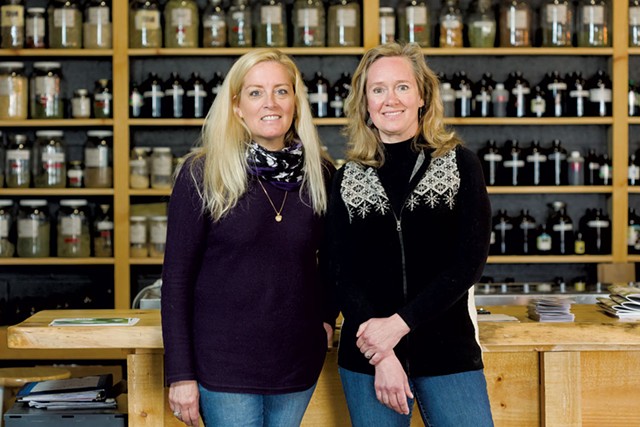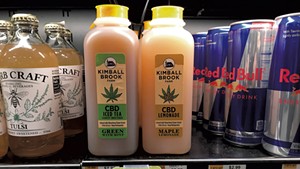
- Oliver Parini
- Louisa Schibli (left) and Janice Shade at the Burlington Herb Clinic
Elias Gardner is a teacher at the New School in Montpelier. He lives in the Middlesex farmhouse where he grew up and rents out bedrooms to offset the cost of buying the house from his parents. Gardner, 29, has paid off his student debt at McGill University. He is starting to save for retirement.
"I realized that I didn't want to be putting money in the stock market," he said. "And, in general, I don't believe in how those companies have to operate."
Gardner looked online for options that would allow him to invest his money locally and came upon a website called Milk Money Vermont. The online business connects Vermont businesses with local investors — typically those who don't have a lot of money to invest.
"I was searching for this, and Milk Money figured out it was needed," Gardner said. "I knew there were probably some companies looking for investors in Vermont, but I didn't know how to find them. Milk Money is that last piece."
Through a process he said is easy to use via the company website — milkmoneyvt.com — Gardner invested $1,500 in two Vermont businesses.
"All I had to do [was] give proof of residency," he said. "It was really easy. You download the form and mail a check."
Chittenden County residents Janice Shade and Louisa Schibli are the founders of Milk Money. Shade, 51, of Jericho is a former director of marketing at Seventh Generation who went on to run her own business, True Body Products. She has an MBA from the Yale School of Management. Schibli, 50, of Charlotte, worked in the shipping business in Switzerland, and later in web development in Switzerland and Vermont. She started a blog, Moogle Vermont, which showcases Vermont companies.
The two met after Schibli read a newspaper article about Shade and True Body, and called her up. Soon, they were kicking around ideas and talking about starting a business together. The women conceived of Milk Money after the State of Vermont fine-tuned a financial regulation — the Vermont Small Business Offering Exemption — to facilitate investment in local enterprises.
The revised regulation allows Vermont businesses to raise as much as $2 million from state residents. And it enables nonaccredited investors, or people without great means, to invest locally. (An accredited investor has more than $1 million in assets and an annual income of $200,000 or more.)
The state tweaked the regulation to help ensure that businesses have the ability and flexibility to raise capital, said Michael Pieciak, commissioner of the Vermont Department of Financial Regulation.
"It's an outgrowth of buy local, eat local," he said. An "invest-local movement is the next logical step."
Vermont has a history of "intrastate investment," Pieciak noted.
This trend dates back to 1984, when Ben & Jerry's offered shares in its company to Vermonters only — and raised more than $750,000.
"They had free-cone, free-prospectus day," Pieciak said. "One in 300 Vermonters owned a share of Ben & Jerry's."
Other Vermont companies, including Catamount Brewing and Earth's Best Organic baby food, also offered investment opportunities to residents, he added.
Benefits of local investment can include helping businesses hire more people, expand their business and increase their payroll, Pieciak said.
"Instead of putting all your money into the Procter & Gambles of the world, where it goes to Wall Street," he said, "money is staying in Vermont."
Milk Money functions as a local investment tool in two capacities: It connects a business with investors, and it acts as an intermediary between the business and the state regulatory agency. Companies that use the online platform for crowdfunding pay fees to Milk Money for services and use of the site.
"People can do this on their own," Shade said. "But we're doing a lot of the heavy lifting for them."
Since last summer, when investment via Milk Money became available, 65 Vermonters have invested roughly $101,000 in local businesses, according to the company. The average investment is about $1,500.
When Milk Money hit the $100,000 mark, the founders felt they had "proven the concept" that Vermonters will write a check to support local companies, Shade said.
"We think the power of what we're doing is: It's all about local," she said. "People get to invest in their neighbors, in their communities. They get to meet the entrepreneurs if they want. They really get to know where their money is going."
This type of community investment is aligned with the interests of the Vermont State Employees Credit Union, which has 63,000 members. The member-owned financial organization invested in Milk Money, marking the first time VSECU has invested outside the credit union, according to Simeon Chapin, director of community and social development.
He declined to specify the amount of the investment but said it was similar to the amount of money VSECU would lend for a home mortgage.
"We believe that a platform that enables everyday Vermonters to invest in Vermont businesses is a good thing and should be available," Chapin said.
[embed-1]Entrepreneurs who seek the services of Milk Money are put through a "rigorous" test, according to company owners. They undergo an evaluation on 10 aspects of their business plan, from management team to product and from "story" to online presence. A score of 80 or above qualifies a business for a fundraising campaign on Milk Money.
"We've talked to 80 entrepreneurs in the last year or so," Shade said. "We're working with eight."
Last July, Burlington Herb Clinic became the first company to sign on with Milk Money. The cooperatively owned clinic on Battery Street focuses on nontraditional healing. The collective is associated with a yoga center and an herb apothecary.
Burlington Herb Clinic has to raise a minimum of $12,500 by June 30 in order to use any Milk Money funds, according to cofounder Katherine Elmer. So far, the clinic has raised $5,000. Investors get their money back if the minimum goal is not reached.
This commitment complies with the state regulation, which requires that a company reach 25 percent of its stated goal before it can access Milk Money dollars, Shade said. A business has a year to reach its fundraising goal. The requirement is a form of protection for the investor, she explained.
Burlington Herb Clinic intends to use the money to expand the number of people who use the center, according to Elmer. In its first year, 130 people were clients at the clinic, she noted.
"We're in an agreement with our investors to make a return for them," Elmer said.
Elmer, who grew up in Cabot, applauds the notion that Milk Money is for "Main Street, rather than Wall Street, investors."
Green Mountain Organic Creamery is the largest company to launch a fundraising campaign on Milk Money. The milk-bottling plant in Hinesburg will celebrate its fifth anniversary with an open house on May 13. The facility is affiliated with Kimball Brook Farm, an organic dairy farm in North Ferrisburgh. Both entities are owned and operated by JD and Cheryl DeVos. The DeVos family has run the dairy farm for 50 years.
When the DeVoses opened their creamery in 2012, a group of 15 people invested in the project, Cheryl DeVos said. All but one of those investors is a Vermonter. More recently, with sales growing at a rapid clip, the couple needed money to invest in inventory.
Through Milk Money, the creamery raised $28,000, DeVos said. This is small change relative to the size of the business: She expects sales of $1.6 million this year, with projections for $2.25 million in sales next year.
"In order to do that, we have to buy inventory up front," DeVos said. "There are a lot of additional costs when you're growing so fast."
Milk Money funds have helped the creamery purchase bottles, caps, labels and a used truck to deliver milk to southern Vermont, western Massachusetts and New York City.
DeVos learned about Milk Money through her chief financial officer. "He introduced us to [Shade and Schibli]," DeVos said. "We thought it was a perfect fit because we're in the milk business, and they're milk money."











Comments (3)
Showing 1-3 of 3
Comments are closed.
From 2014-2020, Seven Days allowed readers to comment on all stories posted on our website. While we've appreciated the suggestions and insights, right now Seven Days is prioritizing our core mission — producing high-quality, responsible local journalism — over moderating online debates between readers.
To criticize, correct or praise our reporting, please send us a letter to the editor or send us a tip. We’ll check it out and report the results.
Online comments may return when we have better tech tools for managing them. Thanks for reading.